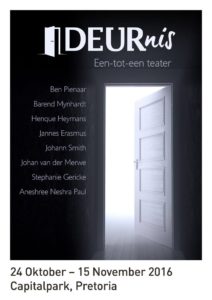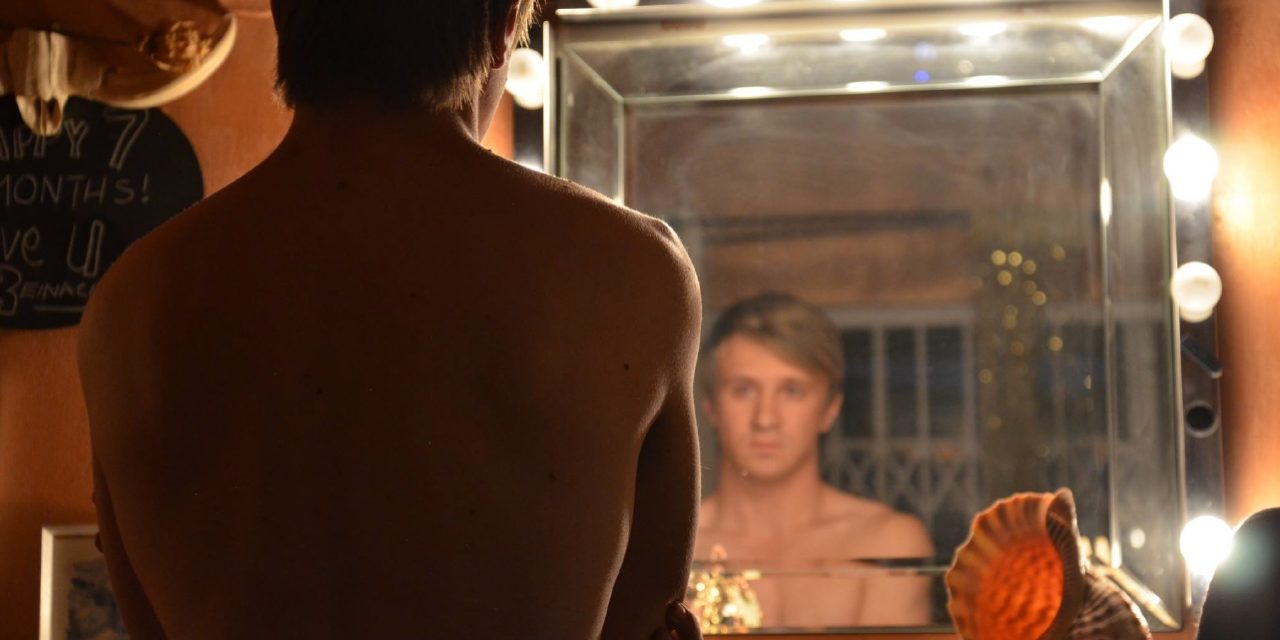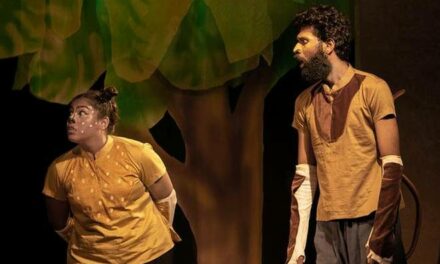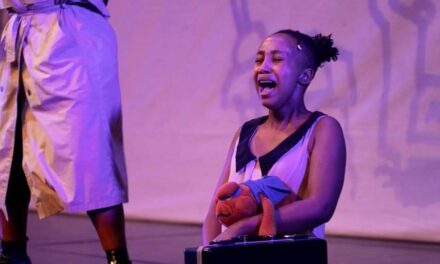 I enter a suburban house in Capitol Park, Pretoria. A suburban house with a dog. Sculptures in the garden and a water-feature. Candles flickering in the dying light of a late, sultry summer’s afternoon. I am one of three guests arriving for tonight’s first set of performances. I am taken by the hand and lead to a closed door in deep in the house. It feels quite intimate. It is a little unsettling. The door opens. I enter.
I enter a suburban house in Capitol Park, Pretoria. A suburban house with a dog. Sculptures in the garden and a water-feature. Candles flickering in the dying light of a late, sultry summer’s afternoon. I am one of three guests arriving for tonight’s first set of performances. I am taken by the hand and lead to a closed door in deep in the house. It feels quite intimate. It is a little unsettling. The door opens. I enter.
It’s me, a man and a closed door behind my back. A bedroom. His. He seems to know me. I answered his message on Tinder. I am there with him. For him. He seems kind, nervous, and uncertain. So am I. He has a ‘tick-list’ of things for us to talk about and check before moving on to do what we do in situations like these. Do I want to…? Does he want to…? Should we…? In between the entanglement of his ‘tick-list’, what he says and does lay guilt, rejection, longing, loathing. So, we don’t. I open the door and exit.
I am taken by the hand and lead to another door. I enter. A young man…boy…hurriedly closes the door. He says that he is cold. That he loves me. He is so close to me that I feel the wind of his breath stroke my cheek, I see the speckles in his eyes, I smell the heat of his body where we touch. His voice caresses me, frightens me with what he says. I can almost feel his heart beating. His chest is naked. Vulnerable. Desirable. He is the forbidden fruit. We can’t be caught. Age. Teacher. Inappropriate. What have I done?
I enter a room, in what seems like the belly of the house. She is bathing, crying, and viciously tearing her heart and guts and womb open. As if it is my fault. Her naked body is not inviting, not exposed, not defenceless. It is an indictment. It is drinking at my soul with the same fervor as it is drinking at her whiskey. It is not a symbol for loss. It is the very essence of loss. It contours regret. It is the shape of pain. It embodies the emptiness of a life unborn. As if it is my fault. I rush out.
The last door opens. The last hand in mine gently lets go. I sit down next to the bath. A story celebrating youthful masculinity and agility. Brotherhood. In other words, damage. And water. Splashing over me, always, water. He…I… is/am engulfed by emotion. Paralyzed by his in/ability. He is ready to move. On. I swear, for a moment, I could see the sea in his eyes.
Producers Johan van der Merwe, Rudi Sadler and Johann Smith, inspired by similar theatrical experiments in Edinburgh, transposed the innovative concept of ‘one-on-one’ theatre to a South African context. The concept of ‘one-on-one’ theatre operates on the principle that a single audience member watches a performance by a single actor in a specific site. For DEURnis, there were three separate solo performances per night, thus three audience members rotate individually to see the performances. This was repeated for more sets of audience members each night. Different playwrights and different directors with various levels of experience worked on the performances. The performances that constitute DEURnis were Bloos (Blush); Swem (Swim); Koud (Cold); Nat (Wet). Thematically, they vary greatly, yet the umbilical cord tying them together is the need for confession and intimacy. Only three of the four works were staged each night, so varied combinations of the four works were staged during the run. All the performances were staged in the same house, using bathrooms and bedrooms in the lived space of a house as sites of performance. The functional and decorative objects that constitute the rooms’ usual interior became scenic devices that were seamlessly integrated into the performances. The opening and closing of the door to a room signaled the start (and end) of the performance.

Aneshree Paul – Director of Nat
DEURnis is a play on words using the Afrikaans word ‘deur,’ which literally means ‘door’ or ‘through,’ and figuratively speaking it is associated with crossing a threshold, a thoroughfare, invitations, access and exclusion, beginnings and endings; and ‘deernis’ meaning ‘compassion.’ Through opening and closing doors, audience members cross the thresholds into the private spaces, lives, thoughts, feelings and experiences of the characters – and into a deeply immersive mode of theatre.
Often, when watching theatre, the juxtaposition of the ‘real’ and the ‘symbolic’ finds audience members oscillating between the two as they try to maintain their suspension of disbelief. The use of rooms in the house as sites of performance invoked this theatrical paradox where two worlds simultaneously exist in the same time-space continuum. Additionally, the close physical proximity between performer and audience member, the intimate feel of entering a private space (someone’s room or bathroom) and the relatively small size of these rooms blurred the porous boundaries between these worlds and more often than not, collapsed the theatrical paradox.
The wor(l)ds that the performers conjured up by interweaving text, site, scenic devices, narratives, symbols, images, emotions (and an audience member) captured a life-moment in time and space that was made almost tangible through the experiential and embodied relational engagement with the audience member that the actor and performance invoked. Feeling a performer’s breath, the wetness of water, or the touch of a hand layers the performances with sensory depth. Invoking visceral, bodily and sensory responses in addition to the profoundly emotive texts, created an intimacy and empathetic engagement that ruptured the boundary between audience and actor, and that continually questioned the subject position of the audience member. Moreover, the immersion that the intimacy and viscerality of these emotionally compelling experiences facilitated awakened the ‘compassion’ that the title alludes to.
I am complicit.
I am sorry.
I do care.
I want to help you.
I love you.
I saw the blood in your tears.
I am you.
If I had to dissect ‘intimacy,’ I would see DEURnis bleed through its body.
DEURnis was sold out for most of its run before it opened and received much critical acclaim. For those who missed this innovation in South African theatre during October-November 2016, Van der Merwe his team plans to further develop DEURnis in 2017. January 2017 will see a new addition to the existing repertoire, entitled Broei (Incubate) and plays in a number of South African languages. Some of Gauteng’s prominent upcoming young artists including Mdu Nhlapo are set to join the DEURnis team in 2017. For further information, audience responses and updates, follow DEURnis on Facebook.
This post was written by the author in their personal capacity.The opinions expressed in this article are the author’s own and do not reflect the view of The Theatre Times, their staff or collaborators.
This post was written by Marié-Heleen Coetzee.
The views expressed here belong to the author and do not necessarily reflect our views and opinions.



















